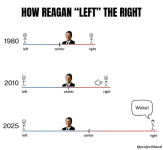If what I posted is inaccurate in any respect, feel free to prove it.
Of course, I'll understand if you can't.
You lie.
First, the ad rearranged Reagan's statements to front-load the harshest anti-tariff warnings, stripping away the speech's introductory framing. The ad opens with Reagan saying, "High tariffs that save one industry or special interest hurt all American industries and workers," followed immediately by, "When one country slams the door on trade, other countries retaliate."
bbc.com
In the original address, these lines appear midway through, after Reagan sets the stage by noting his upcoming meeting with Japanese Prime Minister Yasuhiro Nakasone to address "recent disagreements" on trade and stressing the need for "fair trade" rules to prevent "unfair competition" like subsidized exports.
cnn.com +1
This reordering implies a blanket condemnation of tariffs from the outset, whereas Reagan's full remarks balanced criticism of excessive barriers with endorsement of temporary, targeted ones—such as the 100% duties he had enacted days earlier on Japanese electronics to protect U.S. chipmakers.
nytimes.com +1
The full transcript is available on the Reagan Library's website:
https://www.reaganlibrary.gov/archives/speech/radio-address-nation-free-and-fair-trade. A video of the unedited address can be viewed on the Reagan Library's YouTube channel:
View: https://www.youtube.com/watch?v=example-reagan-address
(as referenced by the Reagan Foundation in their statement).
axios.com
Second, the ad selectively excised passages highlighting Reagan's advocacy for "fair trade" measures, including retaliation against predatory practices, which could be seen as endorsing the very tariff policies the ad opposed. For instance, after quoting Reagan on tariffs leading to "trade wars" and "businesses shutting down," the ad cuts directly to, "The way to prosperity for all nations is rejecting protectionist legislation and promoting fair and free competition."
thecanadianpressnews.ca +1
In context, this follows Reagan's explicit praise for using tariffs strategically: "When other countries practice unfair trade—dumping their products on our market or using massive subsidies to give their exporters an unfair advantage—we must be tough and we must be fair," and his nod to recent U.S. actions like the Japanese tariffs as necessary "short-term" responses.
aljazeera.com +1
By omitting these, the ad portrayed Reagan as an absolutist free-trader, downplaying his administration's actual record of imposing over 200 trade restrictions during his presidency, including those that paved the way for the U.S.-Canada Free Trade Agreement in 1988.
nytimes.com
Fact-checks confirm the quotes are authentic but note this cherry-picking alters the speech's balanced tone:
PolitiFact analysis.
politifact.com
Third, the ad's editing created false continuity by splicing non-consecutive segments without transitions, amplifying a one-sided narrative. The full address weaves anti-tariff warnings with pro-enforcement rhetoric—e.g., Reagan warns of retaliation risks right after justifying U.S. countermeasures—but the ad's one-minute runtime compresses this into a rapid-fire sequence: tariff harms → retaliation → job losses → free competition call, ending on Reagan's line, "Trade barriers hurt every American worker."
bbc.com +1
This flow misleads by implying unbroken opposition, ignoring intervening lines like, "America will not be protectionist," qualified by, "but we will insist on fair trade."
politico.com +1
The Reagan Presidential Foundation & Institute explicitly called this "selective audio and video" a misrepresentation in their October 23, 2025, statement on X, noting no permission was granted for edits:
full statement.
cnn.com +1
A side-by-side comparison in BBC reporting details the splices:
BBC breakdown.
bbc.com

